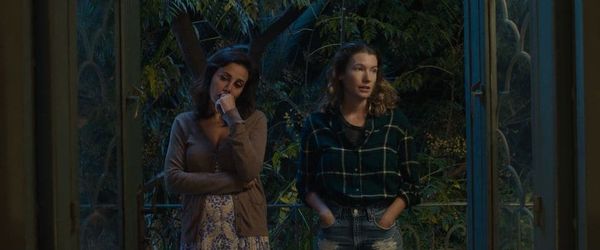Eye For Film >> Movies >> Are You Glad I'm Here? (2018) Film Review
Are You Glad I'm Here?
Reviewed by: Maryam Ghorbankarimi

Noor Gharzeddine’s début feature, Are You Glad I’m Here?, is a film about friendship between two women from two different worlds. They begin their journey innocently but ultimately come away as changed persons. Although not as eventful, there is definitely an intertextual referencing to one of cinema’s most memorable female coming of age films, Thelma And Louise (1991).
A young and naïve American girl, Kirsten, who has gone to Beirut to teach English, befriends her neighbour Nadine, a Lebanese housewife. Nadine’s husband, Pierre, is violent and abusive and in their first meeting, Kirsten observes the bruises on Nadine’s arms but refrains from saying anything. As they get closer to one another, Kirsten babysits their young son, Rami, and spends a lot of time with them while Pierre is away. Kirsten and Nadine share many memories and talk about life and eventually Kirsten starts asking Nadine why she is still with her husband. Nadine always gives a traditional response, explaining her role and responsibilities as a wife and mother and rejecting Kirsten’s pleas for her to leave her abusive husband. Unfortunately, her fights with Pierre become much more intense and Nadine is finally forced to protect herself.

This domestic drama set in Lebanon also has elements of black humour, which is unique in comparison to other Lebanese films. The film begins with a suspenseful scene of the two women and three other men in a car that is stopped by the police. This scene cuts to the title, with the bewildered faces of all the passengers as the driver informs them that the police want them to unwrap the carpet in the boot of the car. The title of the film is written in black font on a red background and on the next shot the subtitles read: “8 months earlier”. The film does not return to this scene to reveal the comedy relief until much later, but rather alludes to the worst possible scenarios as the narrative progresses.
Nadine and Kirsten are as different as they are similar to one another, like two sides of the same coin. It almost feels as though the two women were simultaneously born out of Gharzeddine, herself coming from both cultures as a Lebanese-American director. The film also plays with a lot of stereotypes emanating from both cultures, such as Lebanese men thinking all American girls are easy, or American women believing all young married women in Lebanon are not educated.
Reviewed on: 30 Oct 2018
















